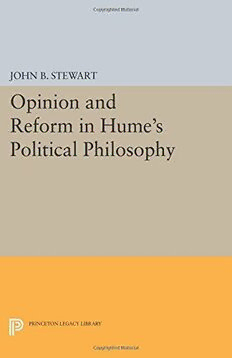
Opinion and Reform in Hume’s Political Philosophy PDF
Preview Opinion and Reform in Hume’s Political Philosophy
OPINION AND REFORM IN HUME'S POLITICAL PHILOSOPHY OPINION AND REFORM IN HUME'S POLITICAL PHILOSOPHY John B. Stewart PRINCETON UNIVERSITY PRESS PRINCETON, NEW JERSEY COPYRIGHT © 3992 BY PRINCETON UNIVERSITY PRESS PUBLISHED BY PRINCETON UNIVERSITY PRESS, 41 WILLIAM STREET, PRINCETON, NEW JERSEY 08540 IN THE UNITED KINGDOM: PRINCETON UNIVERSITY PRESS, OXFORD ALL RIGHTS RESERVED LIBRARY OF CONGRESS CATALOGIWG-IN-PLrBLICAnON DATA STEWART, JOHN B. (JOHN BENJAMIN), 1924- OPINION AND REFORM IN HUME'S POLITICAL PHILOSOPHY/ JOHN B. STEWART. P. CM. INCLUDES BIBLIOGRAPHICAL REFERENCES AND INDEX. ISBN 0-691-08626-5 1. HUME, DAVID, 1711-1776—CONTRIBUTIONS IN POLITICAL SCIENCE 2. HUME, DAVID, 1711-1776—CONTRIBUTIONS IN POLITICAL ETHICS. I. TITLE. JC176.H9S74 1992 320'.01-DC20 91-35909 THIS BOOK HAS BEEN COMPOSED IN L1NOTRON SABON PRINCETON UNIVERSITY PRESS BOOKS ARE PRINTED ON ACID-FREE PAPER, AND MEET THE GUIDELINES FOR PERMANENCE AND DURABILITY OF THE COMMITTEE ON PRODUCTION GUIDELINES FOR BOOK LONGEVITY OF THE COUNCIL ON LIBRARY RESOURCES PRINTED IN THE UNITED STATES OF AMERICA 1 3 5 7 9 1 0 8 6 4 2 Ilml~~fll~;~£~111 I~i;il;~ 1"'"lilll~ij"lll 32101 020765457 CONTENTS PREFACE VII BIBLIOGRAPHIC NOTE lX Introduction 3 ONE The Argument before Hume: The Legalists' Dilemma 13 TWO The Argument before Hume: Beginning a New Science 47 THREE Morality Explained 109 FOUR Civil Society 152 FIVE Hume and Reform: Discovering True Principles 194 SIX Changing the British Mind 224 INDEX 319 PREFACE W HEN I BEGAN reading Hume in the 1950s, few studies of his moral and political philosophy were available; at that time scholarly work was focused almost exclusively on his episte- mology. Since then, however, not only has Book I of the Treatise retained its place as a work of fundamental importance in philosophy, but scholars have gone forward to study Hume's views on "moral subjects"—eco nomics, government, and history. In writing the chapters here presented, I have benefited greatly from books and articles by that large company of scholars who now study eighteenth-century British moral philosophy. It is a polite, industrious company. To acknowledge here all the obli gations I have incurred among its members would be impossible. Suffice it to say that I have profited from many works, perhaps learning more from authors with whom I disagreed—for example, those prominently mentioned in this book—than from many of those with whom I agreed. However, certain scholars must be singled out for thanks—and to do so is a great pleasure—because they participated directly in the writing of this book. Professor Μ. M. Goldsmith, then of Exeter University, En gland, and now of Victoria University, Wellington, New Zealand, made perceptive observations on chapters 2,5, and 6. Professor Russell Hardin, of the University of Chicago, commented constructively on the entire manuscript; he was especially helpful in showing me how best to marshal my argument that Hume was not a conservative. I owe most to Professor David Fate Norton of McGill University. He read the entire manuscript at two stages of its development; on both occasions he proposed some major and many minor changes. I am grateful to these scholars: they prompted important improvements; yet they were content to let me write my own book. In 1979-1980 when, as a member of the faculty of St. Francis Xavier University, Antigonish, Nova Scotia, I was beginning the research that produced this book, I was assisted by a sabbatical leave award from the Humanities and Social Science Research Council of Canada. With plea sure I record my gratitude. BIBLIOGRAPHIC NOTE Editions of Hume's works used: A Treatise of Human Nature. Edited by L. A. Selby-Bigge. Second edition by P. H. Nidditch (Oxford: Clarendon Press, 1978). Cited as Treatise and, for page references in the text, as T. Enquiries concerning Human Understanding and concerning the Princi ples of Morals. The 1777 edition, edited by L. A. Selby-Bigge. Third edition by P. H. Nidditch (Oxford: Clarendon Press, 1975). An En quiry concerning the Principles of Morals is cited in the footnotes as Enquiry II and, for page references in the text, as E. The History of Great Britain: The Reigns of James I and Charles I. First edition. Republished with an introduction by Duncan Forbes (Har- mondsworth: Penguin Books Ltd., 1970). Cited as History of Great Britain. The History of England from the Invasion of Julius Caesar to The Revo lution in 1688, 6 vols. Reprint of the 1778 edition with a foreword by W. B. Todd (Indianapolis: Liberty Fund Inc., 1983). Cited as History of England and, for page references in the text, as H. Essays: Moral, Political, and Literary. Reprint of the 1777 edition (with an apparatus of variant readings from the 1889 edition by Τ. H. Green and Τ. H. Grose) with a foreword and editorial additions by E. F. Miller (Indianapolis: Liberty Fund Inc., 1985). Cited as Essays. The Natural History of Religion and Dialogues concerning Natural Re ligion, the former edited by A. W. Colver, the latter by J. V. Price (Ox ford: Clarendon Press, 1976). The Letters of David Hume, 2 vols. Edited by J.Y.T. Greig (Oxford: Clar endon Press, 1932). Cited as Letters. New Letters of David Hume. Edited by Raymond Klibansky and E. C. Mossner (Oxford: Clarendon Press, 1954). Cited as New Hume Let ters.
